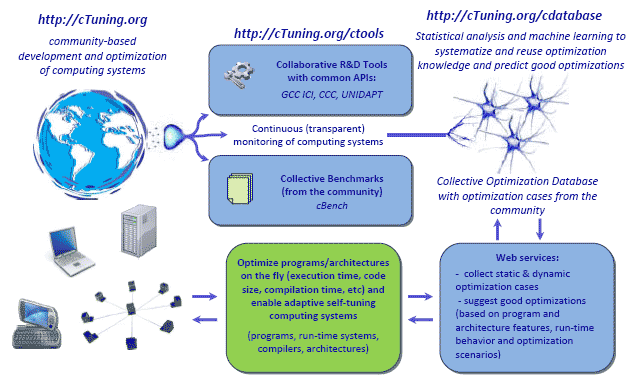From cTuning.org
| Line 1: | Line 1: | ||
{{News| | {{News| | ||
| - | * '''2009.April.23''' - Rice University made an announcement about [http://www.eurekalert.org/pub_releases/2009-04/ru-rpa040709.php a DARPA grant to improve compilers for heterogeneous architectures] - yet another good motivation for us since many similar techniques and open-source tools have been already developed by the cTuning community ([[CTools|cTools]]) and within the [http://www.milepost.eu MILEPOST project] and [http://www.hipeac.net HiPEAC] | + | * '''2009.April.23''' - Rice University made an announcement about [http://www.eurekalert.org/pub_releases/2009-04/ru-rpa040709.php a DARPA grant to improve compilers for heterogeneous architectures] - yet another good motivation for us since many similar techniques and open-source tools have been already developed by the cTuning community ([[CTools|cTools]]) and within the [http://www.milepost.eu MILEPOST project] and [http://www.hipeac.net HiPEAC] showing the power of collaborative R&D ;) ... |
* '''2009.April.21''' - [http://socghop.appspot.com/org/home/google/gsoc2009/gcc Several projects] to enable automatic fine-grain program optimization and run-time adaptation in GCC using iterative compilation and machine learning (based on our cTuning/UNIDAPT/ICI/MILEPOST technology) have been accepted by the Google Summer of Code. You are welcome to [[Join|join cTuning community]] and follow or participate in the developments using our dedicated [[Community|mailing lists]]. | * '''2009.April.21''' - [http://socghop.appspot.com/org/home/google/gsoc2009/gcc Several projects] to enable automatic fine-grain program optimization and run-time adaptation in GCC using iterative compilation and machine learning (based on our cTuning/UNIDAPT/ICI/MILEPOST technology) have been accepted by the Google Summer of Code. You are welcome to [[Join|join cTuning community]] and follow or participate in the developments using our dedicated [[Community|mailing lists]]. | ||
Revision as of 12:17, 23 April 2009
| News |
|

It may not always be visible to the IT users, but developing and optimizing new computing systems using current technology is too time consuming and costly. cTuning.org is a community-driven collaborative Mediawiki-based project that brings together industry, academia and IT users to automate and simplify compiler and architecture design, optimize computing systems collectively and build intelligent self-tuning adaptive computing systems based on statistical and machine learning techniques. We are participating in the following collaborative activities:
- Develop common open-source tools with unified APIs (universal compilers for heterogeneous multi-core architectures, computer architecture simulators, run-time systems) to optimize programs and architectures collectively using iterative compilation, statistical and machine learning techniques. More information is available at cTools page.
- Share interesting optimization cases from the community for programs/libraries/OS (compiler optimizations/architecture configurations to improve execution time, code size, architecture size, power consumption, etc) in the Collective Optimization Database to help users optimize their systems, enable replicable collaborative research and enable further analysis using statistical and machine learning techniques.More information is available at cDatabase page.
- Enable collaborative research using cTools to automate and simplify the process of developing and optimizing new computer architectures, compilers, operating systems and programming environments using statistical analysis, machine learning, dynamic adaptation and bio-inspired techniques. We believe that our adaptive approaches are critical to overcome the complexity of computing systems and improve their performance, power consumption, system size and fault-tolerance automatically while reducing their cost and time to market. More information is available at cResearch page.
Everyone is welcome to use cTools for their R&D, browse and update cDatabase, provide feedback or join cTuning initiative to actively participate in this collaborative effort, extend cTools, cResearch and propose your new collaborative R&D projects for the cTuning community. We hope that this community effort will boost innovation in compiler, OS and architecture technology, provide novel adaptive mechanisms for heterogeneous, reconfigurable multi-core systems and emerging technologies such as cloud computing, will simplify program and architecture design and optimization, reduce system cost and and will eventually have a positive effect on science and industries that demand ever-increasing computing resources while placing strict requirements on systems.
General cTuning R&D directions are modestly moderated by our steering committee.
You can contact cTuning admins directly if you have general questions.
Note: cTuning is an ongoing evolving project - please be patient and tolerant to the community and help us with this collaborative effort!
| cTuning concept: | | cTuning friends: |

| |       
You are welcome to register your interest at this page. |